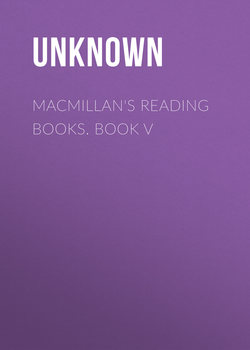Читать книгу Macmillan's Reading Books. Book V - Unknown - Страница 28
На сайте Литреса книга снята с продажи.
BOOK V
AN ESCAPE
ОглавлениеAfter we had rowed, or rather driven, about a league and a half, as we reckoned it, a raging wave, mountain-like, came rolling astern of us, and plainly bade us expect our end. In a word, it took us with such a fury that it overset the boat at once; and, separating us as well from the boat as from one another, gave us not time hardly to say, "O God!" for we were all swallowed up in a moment.
Nothing can describe the confusion of thought which I felt when I sunk into the water; for though I swam very well, yet I could not deliver myself from the waves, so as to draw breath, till that wave having driven me, or rather carried me a vast way on towards the shore, and having spent itself, went back, and left me upon the land almost dry, but half dead from the water I took in. I had so much presence of mind as well as breath left, that, seeing myself nearer the mainland than I expected, I got upon my feet, and endeavoured to make on towards the land as fast as I could, before another wave should return, and take me up again. But I soon found it was impossible to avoid it; for I saw the sea come after me as high as a great hill, and as furious as an enemy, which I had no means or strength to contend with; my business was to hold my breath, and raise myself upon the water, if I could: and so by swimming to preserve my breathing, and pilot myself towards the shore, if possible; my greatest concern now being, that the sea, as it would carry me a great way towards the shore when it came on, might not carry me back again with it when it gave back towards the sea.
The wave that came upon me again, buried me at once twenty or thirty feet deep in its own body; and I could feel myself carried with a mighty force and swiftness towards the shore a very great way; but I held my breath, and assisted myself to swim still forward with all my might. I was ready to burst with holding my breath, when, as I felt myself rising up, so, to my immediate relief, I found my head and hands shoot out above the surface of the water; and though it was not two seconds of time that I could keep myself so, yet it relieved me greatly, gave me breath and new courage. I was covered again with water a good while, but not so long but I held it out; and finding the water had spent itself, and began to return, I struck forward against the return of the waves, and felt ground again with my feet. I stood still a few moments to recover breath, and till the water went from me, and then took to my heels, and run with what strength I had farther towards the shore. But neither would this deliver me from the fury of the sea, which came pouring in after me again, and twice more I was lifted up by the waves, and carried forwards as before, the shore being very flat.
The last time of these two had well near been fatal to me; for the sea having hurried me along as before, landed me, or rather dashed me against a piece of a rock, and that with such force as it left me senseless, and indeed helpless, as to my own deliverance; for the blow taking my side and breast, beat the breath, as it were, quite out of my body; and had it returned again immediately, I must have been strangled in the water; but I recovered a little before the return of the waves, and seeing I should be covered again with the water, I resolved to hold fast by a piece of the rock, and so to hold my breath, if possible, till the wave went back; now as the waves were not so high as at first, being near land, I held my hold till the wave abated, and then fetched another run, which brought me so near the shore that the next wave, though it went over me, yet did not so swallow me up as to carry me away, and the next run I took, I got to the main land, where, to my great comfort, I clambered up the clifts of the shore, and sat me down upon the grass, free from danger, and quite out of the reach of the water.
DEFOE'S Robinson Crusoe.
[Notes: Daniel Defoe, born 1663, died 1731. He was prominent as a political writer, but his later fame has rested chiefly on his works of fiction, of which 'Robinson Crusoe' (from which this extract is taken) is the most important.
"Gave us not time hardly to say." This to us has the effect of a double negative. But if we take "hardly" in its strict sense, the sentence is clear: "did not give us time, even with difficulty, to say."
(at foot)."As I felt myself rising up, so to my immediate relief." Note this use of as and so, in a way which now sounds archaic.
Run. The older form, for which we would use ran.
"That with such force, as it left me," &c. For as, we would now use that.
Clifts of the shore. Like clefts, broken openings in the shore.]
* * * * *
